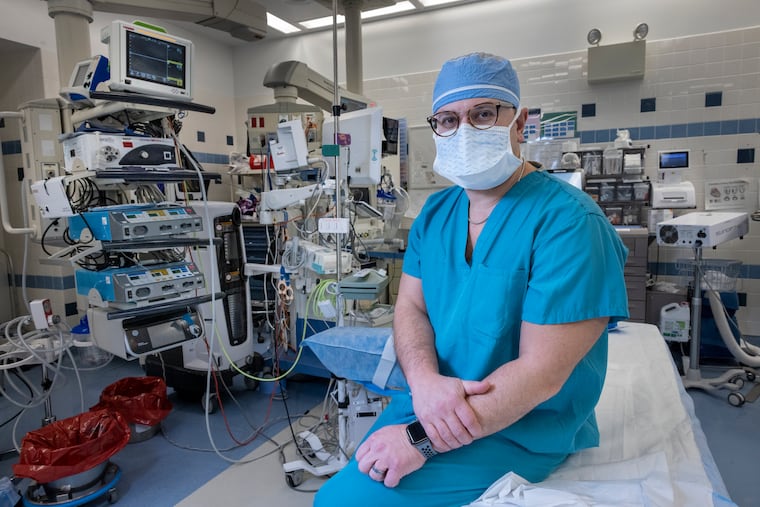The Philly Half Marathon blocked an organ donation driver from delivering a liver. So a surgeon ran through the race to get it
Adam Bodzin ran more than half a mile to get the liver, dodging racers in the Philadelphia Half-Marathon.

With the clock ticking on his precious cargo of a human liver for transplant surgery, a van driver made good time on his way from New York to Philadelphia on a Saturday morning in November.
Until he ran into thousands who were racing against a different clock: runners competing in the Dietz & Watson Philadelphia Half Marathon.
Fortunately for the driver — and the gravely ill patient waiting for the liver at Thomas Jefferson University Hospital — the runners weren’t the only ones wearing athletic shoes.
Clad in sneakers and teal-colored hospital scrubs, Jefferson transplant surgeon Adam Bodzin dashed out the hospital door and ran roughly half a mile to meet the driver, darting through the stream of runners to collect the organ packed in ice.
Once he carried the specially sealed box back across the street — drawing curious stares from a few runners as he zigzagged between them — Bodzin, 41, caught a ride back to the hospital from a police officer who happened to be nearby.
The surgery went well, and three months later, the patient is fine. It remains unclear why the driver was unable to get through the race, despite trying for more than an hour and a half — placing the organ at increasing risk of deterioration.
City officials who organize the race weekend met beforehand with representatives from Jefferson, telling them about emergency access points along the route for three races — the half-marathon and an 8-kilometer event on Nov. 19, followed by a marathon the next day. The city also provided the hospital with emergency contact information in the event of problems, said David G. Wilson, the city’s deputy managing director for events.
“We were not aware of any issues with access to the hospitals for last year’s race,” he said in an email.
Then there’s the fact that the driver was from out of town, and Philly’s grid of one-way streets, half-blocks, and diagonals can be tricky even for the experienced.
As he drove around, increasingly anxious, the organ courier came across police stationed at one barricade, and was directed to an access point, according to Bodzin, the surgeon, who was in touch with him by phone.
But when the courier got there, despite driving a van with emergency lights and sirens, he could not get through.
“He felt terrible,” the physician said.
» READ MORE: This new technique is increasing the number of hearts for transplant
The driver was hired by Gift of Life Donor Program, the nonprofit that coordinates organ donation for transplants in the Philadelphia region.
Rick Hasz, the organization’s president and chief executive officer, said he did not know the details of the driver’s difficulties, but he praised Bodzin for going the extra mile.
“Dr. Bodzin’s quick action demonstrated his commitment to honoring the selfless generosity of all donors and their families and gives hope to everyone waiting for a second chance at life,” he said in an email.
The waiting patient
Charles Rowe, the recipient of the liver that Bodzin raced to get, had been waiting 15 months for a transplant, which he needed due to complications from hepatitis C.
As Rowe, 66, of Port Richmond, lay on a stretcher at the hospital before the surgery, he was surprised to learn why he had to wait a bit longer.
“The next thing I know, they said he was going to go get it,” he said of his surgeon, in a phone interview. ”I said, ‘Omigosh!’”
Rowe said he heard the full story after he woke up from the surgery, and told the surgeon he was a hero.
» READ MORE: For a few patients with severe COVID, the answer is a lung transplant
“He said ‘No, you’re the hero,’” the patient recalled.
Livers can start to deteriorate when preserved on ice for more than eight hours, Bodzin said. By the time he got back to the hospital and began the surgery, it had been close to nine hours.
Yet afterward, Rowe’s vital signs were better than average for liver transplant recipients, and he was home in six days.
“The guy did probably as well as you could ever hope for,” his surgeon said.
Bodzin’s route took him from the hospital entrance near 11th and Chestnut Streets, through the stream of runners on Lombard Street, then another block to South Street.
He is not sure how long it took, but he was grateful for the ride back from police.
“I’m more of a biker,” he said.